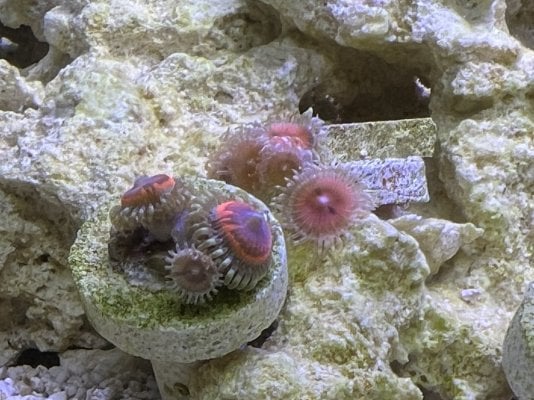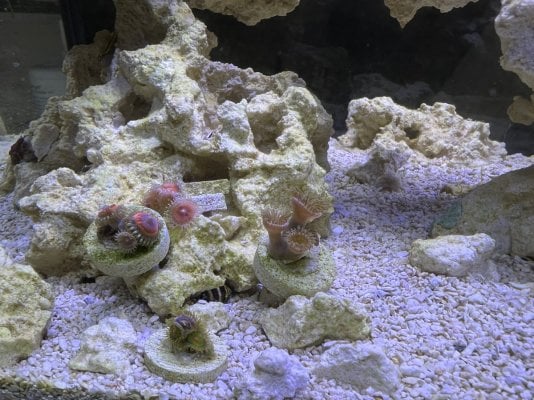Hi there,
I have Fluval evo 13.5g tank started at the end of September. Haven’t replaced light or filtration. I have introduced multiple Zoa and Duncan coral in mid October. Then hammers in November and few corals in December.
Zoa corals seemed to be doing well for a month or so. But then I noticed Zoa becoming duller and duller. Some have shrienked. Though they continue to grow small heads. What can be the problem with them?
Current inhabitants:
2 hermit crabs
Trochus snail, astrea snail, cerith snail, bumblebee snail
1 clownfish
1 shark nose goby
1 rock flower anemone
1 Duncan coral
2 hammer corals (seem to be the most thriving of the corals now)
1 micromussa
1 acan bowerbanki
1 acan lord
Big piece of Chaeto
My water parameters:
NO2 = 0
NO3 = 0
pH = 8.3
kH = 8.0 - 8.7
Ca = 360
Mg = 1010
PO4 = 0
Salinity = 1.025-1.026
Temp = 26C
I’ve got tests for Ca and Mg just couple of days ago, so started to raise these parameters slowly. Alkalinity fluctuates through the week: highest after water change and then falls each day.
I dose 5ml of all-for-reef everyday (started recently as well)
Chaeto grows really nicely now. Introduced copepods as well
Attached photos of zoa


I have Fluval evo 13.5g tank started at the end of September. Haven’t replaced light or filtration. I have introduced multiple Zoa and Duncan coral in mid October. Then hammers in November and few corals in December.
Zoa corals seemed to be doing well for a month or so. But then I noticed Zoa becoming duller and duller. Some have shrienked. Though they continue to grow small heads. What can be the problem with them?
Current inhabitants:
2 hermit crabs
Trochus snail, astrea snail, cerith snail, bumblebee snail
1 clownfish
1 shark nose goby
1 rock flower anemone
1 Duncan coral
2 hammer corals (seem to be the most thriving of the corals now)
1 micromussa
1 acan bowerbanki
1 acan lord
Big piece of Chaeto
My water parameters:
NO2 = 0
NO3 = 0
pH = 8.3
kH = 8.0 - 8.7
Ca = 360
Mg = 1010
PO4 = 0
Salinity = 1.025-1.026
Temp = 26C
I’ve got tests for Ca and Mg just couple of days ago, so started to raise these parameters slowly. Alkalinity fluctuates through the week: highest after water change and then falls each day.
I dose 5ml of all-for-reef everyday (started recently as well)
Chaeto grows really nicely now. Introduced copepods as well
Attached photos of zoa





























